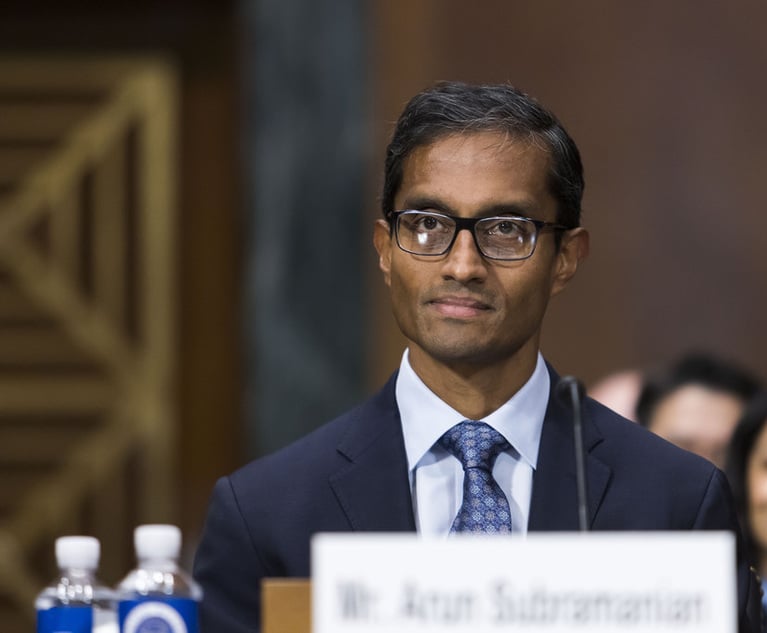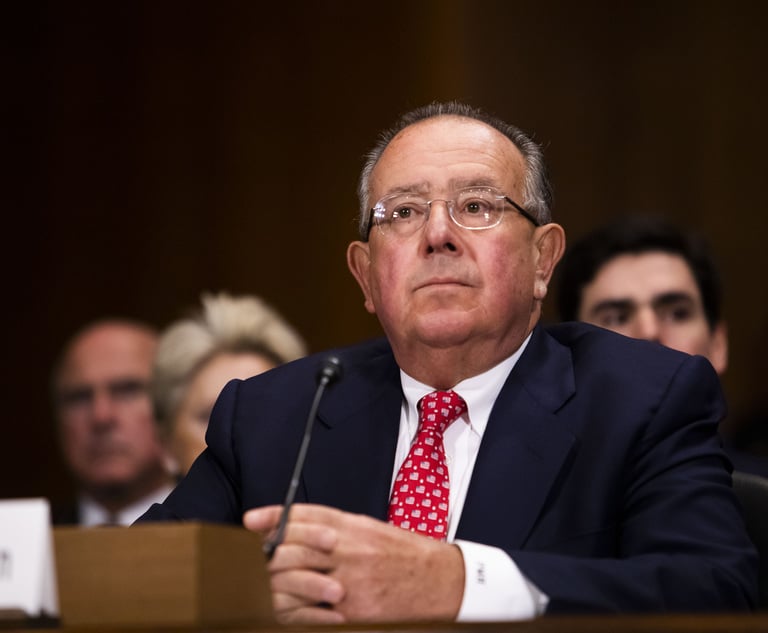Supreme Court Upholds Constitutionality of 'Patent Death Squads'
In 2011, President Barack Obama signed into law the Leahy-Smith America Invents Act, which brought the most sweeping change to American patent laws since the 1952 Patent Act.
May 22, 2018 at 12:04 PM
7 minute read

In 2011, President Barack Obama signed into law the Leahy-Smith America Invents Act, which brought the most sweeping change to American patent laws since the 1952 Patent Act. One of the most significant changes came in the form of a new regime for the administrative review—and, in many cases, invalidation—of U.S. patents. That regime has now been tested through, and survived, constitutional scrutiny at the Supreme Court.
The Rise of Inter Partes Review
The inter partes review proceedings (IPRs) implemented under the America Invents Act have significantly changed the way that patent disputes are resolved in the United States. The America Invents Act created the Patent Trials and Appeals Board (PTAB), an administrative body within the U.S. Patent and Trademark Office that oversees IPRs and other patent review proceedings in an administrative trial setting. Panels of three administrative patent judges (APJs) are assigned to each petition; they consider whether to review the patents identified in the petition, and then, after determining that a review should be instituted, proceed along an 18-month statutory timeline to a decision on the validity of the patents. The procedure provides an opportunity for the APJs to check the patent examiner's work, in a deeper dive than would normally occur during patent examination, and often with far more relevant invalidating prior art publications than the patent examiner may have originally considered.
These proceedings have been, to put it mildly, effective. According to the U.S. Patent and Trademark Office's most recent statistics, over 60 percent of petitions filed result in a decision to institute IPR (down from 75 percent in 2014); of those that are instituted and reach a final written decision, over 80 percent result in the cancellation of at least some patent claims, while approximately 65 percent result in the cancellation of all the challenged patent claims. These high rates of invalidation have been a boon for defendants in patent disputes, and have led some, including former Federal Circuit Chief Judge Randall Rader, to refer to these PTAB panels as “patent death squads.” See, e.g., Tony Dutra, ”Rader Regrets CLS Bank Impasse, Comments on Latest Patent Reform Bill,” Bloomberg BNA, Oct. 29, 2013.
The availability of IPRs has directly impacted the number of patent cases filed in U.S. district courts. Last year marked the second consecutive year of decline in the total number of patent cases filed in district courts, down from an all-time high in 2013 of over 6,000 cases, to just over 4,000 cases in 2017. Notably, over 1,500 IPR challenges were filed in each year from 2014 to 2017. This migration of patent disputes from district courts to the PTAB makes sense both for strategic and cost reasons: higher invalidation rates in the PTAB are driven by a lower standard for and fewer obstacles to proving invalidity, and the PTAB offers increased speed and lower cost as compared with district court litigation.
With that backdrop, last month the Supreme Court issued its widely anticipated decision in Oil States Energy Services v. Greene's Energy Group, 138 S.Ct. 1365 (2018), in which the constitutionality of these IPR proceedings was challenged—and ultimately affirmed.
The Supreme Court's Decision in 'Oil States'
In Oil States, the Supreme Court took on the questions of whether IPRs violate either Article III of the Constitution or the Seventh Amendment. Justice Clarence Thomas wrote the majority opinion which began with, and focused primarily on, the challenge under Article III.
Petitioner and patent holder Oil States had argued that IPR is an adversarial proceeding that violates the Constitution by extinguishing private property rights through a non-Article III forum without a jury. In determining whether a proceeding involves an exercise of Article III judicial power, the court explained that its precedents distinguish between “public rights” and “private rights.” If patents constitute public rights, the assigning of those public rights would fall within the significant latitude given to Congress, and thus not raise the Article III concerns argued by the petitioner.
Within that framework, the court began with the premise that it “has long recognized that the grant of a patent is a 'matter involving public rights.'” The court treated similarly the granting and revoking of those rights, referring to IPR as “a second look at an earlier administrative grant of a patent,” and concluded that IPR “involves the same basic matter as the grant of a patent. So it, too, falls on the public-rights side of the line.” The court therefore held that “the public-rights doctrine covers the matter resolved in inter partes review. The Constitution does not prohibit the board from resolving it outside of an Article III court.”
The court gave the Seventh Amendment challenge shorter shrift, noting that when Congress properly assigns a matter to a non-Article III tribunal for adjudication, “the Seventh Amendment poses no independent bar to the adjudication of that action by a nonjury factfinder.” Thus, because the court determined that IPRs are matters Congress can properly assign to the Patent Office, it concluded a jury is not required in IPR proceedings, and thus Seventh Amendment concerns are not implicated.
The decision is not all that surprising. Many commentators believed this would be the result for a number of reasons, and particularly after the oral argument, during which Oil States conceded the constitutionality of other decades-old administrative patent invalidation proceedings (including ex parte reexamination), and had a difficult row to hoe in trying to differentiate IPRs from those older proceedings on constitutional grounds.
Notably, the court was careful to limit the reach of its decision: “We emphasize the narrowness of our holding. We address the constitutionality of inter partes review only. … Moreover, we address only the precise constitutional challenges that Oil States raised here.” The court further cautioned that the decision “should not be misconstrued as suggesting that patents are not property for purposes of the Due Process Clause or the Takings Clause.”
Justice Stephen Breyer, joined by Justice Ruth Bader Ginsburg and Justice Sonia Sotomayor, concurred, advising that the court's opinion should not be read to suggest that matters involving private rights may never be adjudicated other than by Article III courts.
Justice Neil Gorsuch penned a dissenting opinion, joined by Chief Justice John Roberts, which argued that patent rights should be adjudicated by Article III courts. The dissent emphasized the historical importance of an independently functioning judiciary, and warned that “[t]oday, the government invites us to retreat from the promise of judicial independence.” In particular, the dissent stressed that the director of the Patent Office is a political appointee who serves at the pleasure of the president, and is empowered to select the panel members responsible for hearing any particular challenge. “If they (somehow) reach a result he does not like, the director can add more members to the panel—including himself—and order the case reheard. Nor has the Director proven bashful about asserting these statutory powers to secure the 'policy judgments' he seeks.”
Opponents of the PTAB have not given up. Just weeks after the decision, a class action lawsuit was filed on behalf of patent holders challenging the invalidation of patents by the PTAB as violations of the Takings Clause of the Fifth Amendment, accepting the invitation from the Oil States majority that its opinion “should not be misconstrued as suggesting that patents are not property for purposes of the Due Process Clause or the Takings Clause,” Christy v. USA, Civil Action No. 18-cv-00657-MMS, at 24-25 (Ct. Fed. Clms., May 9, 2018). According to the complaint, “the USPTO's invalidation of the plaintiff's and class member's patent claims was a taking without just compensation in violation of the Fifth Amendment of the Constitution.”
It remains to be seen whether this or any other future constitutional challenges to the PTAB can gain traction. Still, for the time being and likely for the foreseeable future, the PTAB will remain intact to march on as a powerful check on the work of patent examiners, and as an important defensive tool for alleged infringers.
Rob Maier is a patent lawyer and intellectual property partner in the New York office of Baker Botts.
This content has been archived. It is available through our partners, LexisNexis® and Bloomberg Law.
To view this content, please continue to their sites.
Not a Lexis Subscriber?
Subscribe Now
Not a Bloomberg Law Subscriber?
Subscribe Now
NOT FOR REPRINT
© 2025 ALM Global, LLC, All Rights Reserved. Request academic re-use from www.copyright.com. All other uses, submit a request to [email protected]. For more information visit Asset & Logo Licensing.
You Might Like
View All
Decision of the Day: Judge Dismisses Defamation Suit by New York Philharmonic Oboist Accused of Sexual Misconduct

Private Equity Giant KKR Refiles SDNY Countersuit in DOJ Premerger Filing Row
3 minute read
Decision of the Day: Judge Rules Brutality Claims Against Hudson Valley Police Officer to Proceed to Trial

Skadden and Steptoe, Defending Amex GBT, Blasts Biden DOJ's Antitrust Lawsuit Over Merger Proposal
4 minute readTrending Stories
Who Got The Work
J. Brugh Lower of Gibbons has entered an appearance for industrial equipment supplier Devco Corporation in a pending trademark infringement lawsuit. The suit, accusing the defendant of selling knock-off Graco products, was filed Dec. 18 in New Jersey District Court by Rivkin Radler on behalf of Graco Inc. and Graco Minnesota. The case, assigned to U.S. District Judge Zahid N. Quraishi, is 3:24-cv-11294, Graco Inc. et al v. Devco Corporation.
Who Got The Work
Rebecca Maller-Stein and Kent A. Yalowitz of Arnold & Porter Kaye Scholer have entered their appearances for Hanaco Venture Capital and its executives, Lior Prosor and David Frankel, in a pending securities lawsuit. The action, filed on Dec. 24 in New York Southern District Court by Zell, Aron & Co. on behalf of Goldeneye Advisors, accuses the defendants of negligently and fraudulently managing the plaintiff's $1 million investment. The case, assigned to U.S. District Judge Vernon S. Broderick, is 1:24-cv-09918, Goldeneye Advisors, LLC v. Hanaco Venture Capital, Ltd. et al.
Who Got The Work
Attorneys from A&O Shearman has stepped in as defense counsel for Toronto-Dominion Bank and other defendants in a pending securities class action. The suit, filed Dec. 11 in New York Southern District Court by Bleichmar Fonti & Auld, accuses the defendants of concealing the bank's 'pervasive' deficiencies in regards to its compliance with the Bank Secrecy Act and the quality of its anti-money laundering controls. The case, assigned to U.S. District Judge Arun Subramanian, is 1:24-cv-09445, Gonzalez v. The Toronto-Dominion Bank et al.
Who Got The Work
Crown Castle International, a Pennsylvania company providing shared communications infrastructure, has turned to Luke D. Wolf of Gordon Rees Scully Mansukhani to fend off a pending breach-of-contract lawsuit. The court action, filed Nov. 25 in Michigan Eastern District Court by Hooper Hathaway PC on behalf of The Town Residences LLC, accuses Crown Castle of failing to transfer approximately $30,000 in utility payments from T-Mobile in breach of a roof-top lease and assignment agreement. The case, assigned to U.S. District Judge Susan K. Declercq, is 2:24-cv-13131, The Town Residences LLC v. T-Mobile US, Inc. et al.
Who Got The Work
Wilfred P. Coronato and Daniel M. Schwartz of McCarter & English have stepped in as defense counsel to Electrolux Home Products Inc. in a pending product liability lawsuit. The court action, filed Nov. 26 in New York Eastern District Court by Poulos Lopiccolo PC and Nagel Rice LLP on behalf of David Stern, alleges that the defendant's refrigerators’ drawers and shelving repeatedly break and fall apart within months after purchase. The case, assigned to U.S. District Judge Joan M. Azrack, is 2:24-cv-08204, Stern v. Electrolux Home Products, Inc.
Featured Firms
Law Offices of Gary Martin Hays & Associates, P.C.
(470) 294-1674
Law Offices of Mark E. Salomone
(857) 444-6468
Smith & Hassler
(713) 739-1250






